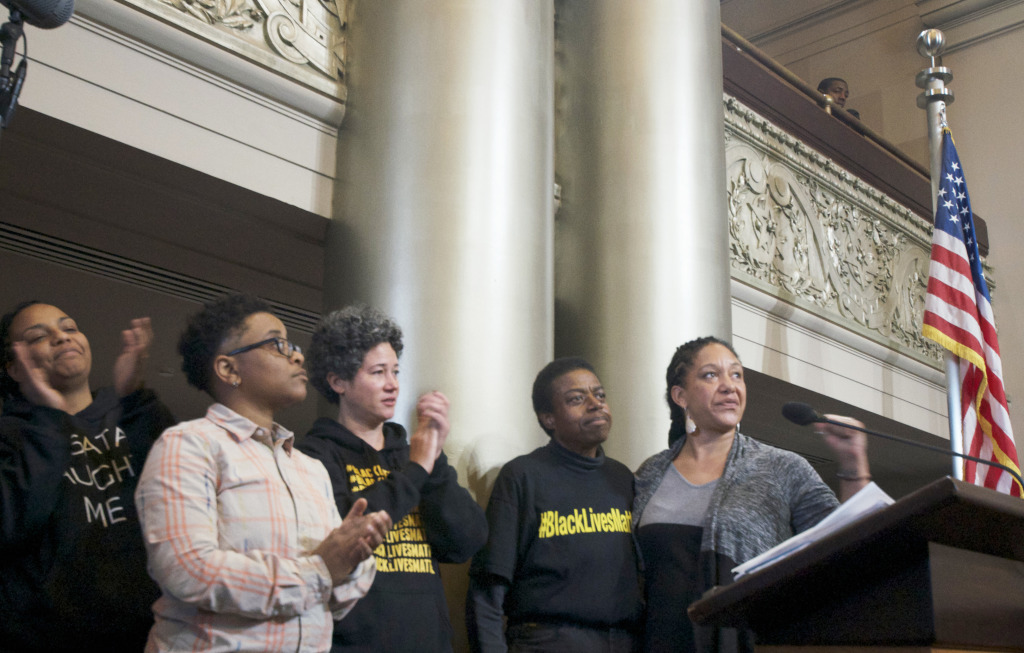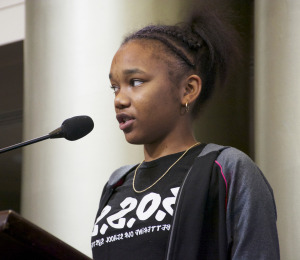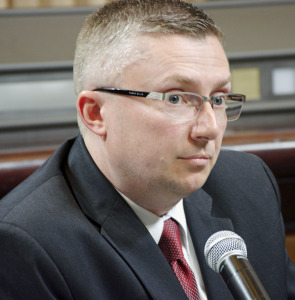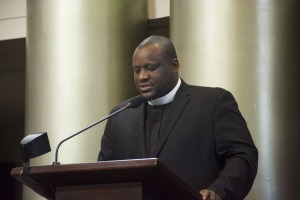Community, Black Friday 14 Tell City Council: “The People Have Had Enough”
Jan 30, 2015

By Ashley Chambers and Ken Epstein
Oakland has the chance to become a model for cities across the country on how city government can effectively respond to the Black Lives Matter movement, according to activists and City Councilmembers.
In a special City Council hearing on Saturday, Jan. 24, community members addressed elected officials demanding that they prioritize concerns of the community, including a stop to racial profiling and police violence, an end to marginalizing of communities of color in jobs and economic development and a halt to the gentrification that is displacing so many low-income Oakland residents.
Cat Brooks, co-chair of the Onyx Organizing and one of the Black Friday 14 activists facing charges for shutting down BART on the day after Thanksgiving, was the first speaker, standing at the podium flanked by a number of other members of the Black Friday 14.
“The people have had enough. There is a righteous anger that has swept the country,” said Brooks. “We don’t have to apologize for that anger or any of the responses to it.”

She reminded city officials: “This is a national movement, and it is not going (away). It is picking up steam, growing every day.
Speaking to the possibilities facing the movement in Oakland, she said, “We have an amazing opportunity before us to be a model for the rest of the country,” she said.

“There must be a specific accepting and addressing of the crimes against the people. We are demanding accountability and community control of every step of this process,” she said.
Pastor Michael McBride, who has been on the frontlines of the Black Lives Matter movement and stood with activists in Ferguson, MO, spoke about the need for government action to “heal our communities” and “restore the public trust.”
“Our executive leadership in this city and county must remove the structuralized racism that pervades the City of Oakland, the police department, and the Oakland Unified School District,” said McBride. “Our clergy must face head-on the complicity and apathy that characterizes our congregations and religious institutions.”
Although the Oakland Police Department has gone for the last 20 months without an officer-involved shooting, McBride added, “We must admit that the history of unconstitutional policing is part of our social memory and identity as a city and still requires much healing and reform.”
Speaking on a panel, Oakland Police Department (OPD) Chief Sean Whent said, “We have made significant changes, (but) I don’t know if it were not for the lawsuit (that put OPD under federal court oversight), if it would have changed. We are absolutely committed to policing that is constitutional and progressive and seen as legitimate by the people who (the department) serves. “
“We can build a (better) relationship long term, and we can all live in a safer community,” Whent said.
Student Regineé Hightower, with the Black Organizing Project, talked about ending the “school to prison pipeline.”
“We don’t have enough teachers who reflect our community,” Hightower said. “There is too much investment of police in schools. We don’t want police in our schools at all.”

Karissa Lewis, one of the Black Friday 14, said, “I think that everybody on this panel (and city councilmembers) can be doing their part to look at how they are criminalizing young Black and Brown folks…We all have a part to play in shifting the way that police criminalize us.”
Referring to the people in the movement, Lewis said, “We are going to be in the streets until folks are ready to confront the issue around the war on Black folks.”
Robbie Clark, a member of the Black Friday 14, said: “We have to be clear about what it means when we’re talking about Black Lives Matter. We’re talking about all Black lives – Black women, queer lives and formerly incarcerated lives.”
“When we talk about state-sanctioned violence, it’s also about what (violence) looks like economically, state-sanctioned economic violence.”
She also said that racism included the way that rents are raised illegally and Oakland residents are pushed out of their homes through gentrification.
“The gang injunctions…and increased policing in an area are part of the displacing of Black people from Oakland,” Clark said. “(These issues) are all interrelated and connected.”
“We need to continue to make sure community residents are part of the dialogue and decisions, especially when we talk about economic development,” Clark said.
Rashidah Grinage of PUEBLO praised the activists in the streets. “Without your work, we wouldn’t be here today,” she said.
Grinage said that despite a succession of mayors, city administrators and police chiefs, OPD remained impervious to change for over a decade.
To guarantee that there is oversight, she said, the city needs an independent civilian police review commission with power to discipline officers and whose rulings are not reversible by arbitration.
In addition, the commission must be instituted by a charter amendment so that it cannot be undone “by future councils or future mayors,” she said.
The discussion of these issues will continue at the City Council meeting Feb. 3.